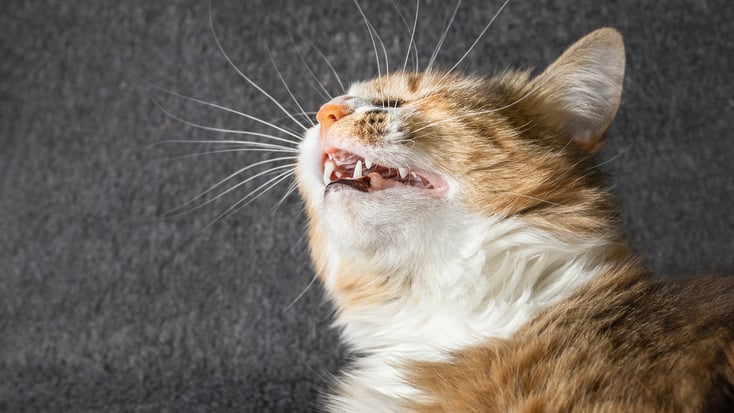Why is My Cat Sneezing? 8 Typical Reasons

Table of Contents
2. Foreign Objects and Irritants
3. Allergies
4. Strong Smells
5. Viral Respiratory Infections
6. Bacterial Infections
7. Nasal Polyps or Tumors
8. Dental Problems
When to Seek Veterinary Care
Veterinary Diagnosis for Cat Sneezing
Treating Your Sneezing Cat
Home Remedies to Relieve a Sneezing Cat
Summary: Occasional sneezing in cats is completely normal, however it's important to be aware of any changes in their sneezing patterns. If your cat is sneezing more than usual or sneezing continuously, it could be a sign that something else is going on.
As an experienced and licensed veterinarian, sneezing in cats is an incredibly common topic pet parents ask me about. Just like us, sneezing is completely normal for our feline friends. It's their way of removing irritants or foreign particles from their noses.
⚠️Note: It's important to consult a veterinarian for a proper diagnosis if your cat is experiencing persistent sneezing or other concerning symptoms.
There are many potential causes for a cat’s sneezing, but these are some of the most common:
1. A Nose Tickle
Just like humans, a tickle in a cat’s nose can cause sneezing. Dust, pollen, and fur are all common offenders. A nose tickle typically causes a single sneezing event rather than prolonged sneezing.
2. Foreign Objects and Irritants
Inhaled irritants like dust, smoke, or strong odors can irritate a cat's nasal passages and cause sneezing.
3. Allergies
Cats can develop allergies to environmental factors such as pollen, dust mites, mold, or certain chemicals, triggering sneezing.
4. Strong Smells
Cats are known for their aversion to strong smells. Chemicals, perfumes, and even some foods may smell bad to your cat, and they may sneeze as a result. Like a nose tickle, this would be occasional rather than ongoing behavior.
5. Viral Respiratory Infections
Feline Herpesvirus and Calicivirus are common viral infections that affect cats' respiratory systems, leading to sneezing, nasal discharge, and other symptoms.
To prevent your cat from catching these contagious respiratory infections, it's important to have them fully vaccinated.
Keep reading: Kitten and Cat Vaccinations
6. Bacterial Infections
Bacterial upper respiratory infections (URIs), caused by bacteria like Bordetella, Mycoplasma, and Chlamydophila, can result in sneezing, nasal discharge, coughing, and respiratory distress.
7. Nasal Polyps or Tumors
Abnormal growths in the nasal passages, such as polyps or tumors, can provoke sneezing in cats.
8. Dental Problems
Dental issues, like infected teeth or gum disease, may cause referred pain to the nasal area and trigger sneezing.
When to Seek Veterinary Care
If you observe any of the following symptoms along with sneezing, it is advisable to seek veterinary attention:
-
Persistent or frequent sneezing: If your cat's sneezing becomes frequent and doesn't seem to resolve over time, it may be a cause for concern.
-
Nasal discharge: Keep an eye out for any abnormal nasal discharge, such as mucus or blood. Excessive or persistent discharge can indicate an underlying issue.
-
Difficulty breathing: If your cat is having difficulty breathing, such as wheezing, coughing, or rapid breathing, it could signify a more serious respiratory problem and is always a reason to go to an emergency vet clinic ASAP.
-
Loss of appetite or lethargy: If your cat's sneezing is accompanied by a loss of appetite, reduced energy levels, or increased lethargy, it may suggest an underlying illness that requires attention.
Should My Pet Be Seen by a Veterinarian?
1. Have you noticed changes in your pet’s appetite?
2. Does your pet have diarrhea or loose stools?
3. Have you noticed changes in your pet’s thirst/water consumption?
4. Is your pet having accidents in the house?
5. Is your pet pacing and unable to settle?
6. Is your pet panting more than usual?
7. Is your pet whining or vocalizing more than usual?
8. Is your pet shaking more than usual?
9. Is your pet hiding or avoiding physical contact more than usual?
10. Is your pet more lethargic and sleeping more than usual?
11. Are you concerned about changes in your pet’s behavior?
12. Is your pet scratching their ears?
13. Is your pet licking their paws more than usual?
14. Does your pet have a rash?
15. Is your pet moving more slowly than usual or having a harder time getting up or down?
View Results
Should My Pet Be Seen by a Veterinarian?
1. Have you noticed changes in your pet’s appetite?
2. Does your pet have diarrhea or loose stools?
3. Have you noticed changes in your pet’s thirst/water consumption?
4. Is your pet having accidents in the house?
5. Is your pet pacing and unable to settle?
6. Is your pet panting more than usual?
7. Is your pet whining or vocalizing more than usual?
8. Is your pet shaking more than usual?
9. Is your pet hiding or avoiding physical contact more than usual?
10. Is your pet more lethargic and sleeping more than usual?
11. Are you concerned about changes in your pet’s behavior?
12. Is your pet scratching their ears?
13. Is your pet licking their paws more than usual?
14. Does your pet have a rash?
15. Is your pet moving more slowly than usual or having a harder time getting up or down?
Share Quiz
Veterinary Diagnosis for Cat Sneezing
To determine the cause of your cat’s sneezing, your veterinarian will employ a comprehensive approach to diagnose the cause and develop an appropriate treatment plan.
The diagnosis process involves:
-
A thorough physical examination, assessing your cat’s overall health and the nasal passages for any abnormalities.
-
Looking through their medical history.
-
Tests like blood work or nasal swabs may be recommended to identify infectious agents.
-
Imaging studies, such as X-rays, to detect tumors or abnormalities.
-
Rhinoscopy with a small camera can provide detailed visualization of the nasal passages.
Treating Your Sneezing Cat
The treatment options for cat sneezing will vary depending on the diagnosed cause.
-
For allergies: management strategies may involve identifying and avoiding allergens whenever possible. In some cases, your veterinarian or allergist may recommend antihistamines or immunotherapy to help alleviate allergy symptoms and provide relief.
-
Bacterial or viral respiratory infections: medications such as antibiotics or antiviral drugs may be prescribed to specifically address the infectious agents involved.
-
Foreign objects: is identified as the culprit, the object may need to be safely removed under veterinary supervision.
Home Remedies to Relieve a Sneezing Cat
Your veterinarian will tailor the treatment approach based on the diagnosed cause and your cat's unique needs. They will consider factors specific to your cat's situation to develop a personalized treatment plan.
Supportive care measures can play a significant role in providing relief and promoting healing. This can include gentle nasal rinses or saline solutions to flush the nasal passages, as well as ensuring a humidified environment to soothe irritated respiratory tissues.
Here are some additional tips to help your sneezing cat and promote their respiratory health at home:
-
Maintain cleanliness: regularly clean your cat's bedding, litter box, and living areas to reduce dust, dander, and irritants.
-
Minimize allergen exposure: take steps to minimize your cat's exposure to known allergens like pollen or dust mites. Make necessary adjustments to their surroundings.
-
Vaccinations: ensure your cat is up to date with vaccinations to protect against common viral infections that can cause respiratory issues.
-
Dental care: take care of your cat's oral health through regular brushing and dental checkups. Dental problems can contribute to sneezing.
Conclusion
If your cat’s sneezing is persistent or they seem off in other ways, seek expert advice from a veterinarian. Working with a caring professional, you can uncover the reason behind the sneezing and find customized solutions for your cat's comfort and relief.
Remember, a veterinarian is your trusted partner in helping your cat enjoy a healthier and happier life, free from troublesome sneezes.
Same-Day In-Home Sick Pet Visits
Don't wait for your pet's condition to worsen. Our mobile veterinarians provide same-day and next-day in-home sick pet visits. Schedule now for peace of mind.
Frequently Asked Questions
What is normal sneezing in cats?
Occasional sneezing in cats is a normal part of their respiratory system. It serves as a mechanism to clear irritants, such as dust or pollen, from their nasal passages. Just like humans, cats may experience the occasional sneeze as they go about their daily activities. If you notice your feline friend letting out an occasional "achoo," there's no cause for concern.
How do I help my sneezing cat?
It's important to consult a veterinarian to determine the underlying cause and appropriate treatment for your sneezing cat. Based on the diagnosis, your vet may recommend medications, such as antihistamines or antibiotics. Avoid giving any over-the-counter medicines without professional guidance, as they may harm your cat's health.
Can I give my cat Benadryl for sneezing?
Benadryl is sometimes used for chronic allergies in cats, but it's essential to consult a veterinarian for proper guidance. The dosage and suitability of Benadryl vary depending on your cat's specific condition and overall health.
Why does my cat keep sneezing but seems fine?
Typically, if your cat is sneezing more than usual but otherwise seems healthy, it is probably due to a passing allergen, cold, or irritant. However, if your cat’s sneezing persists, only a veterinarian can make a definitive diagnosis.
Can I get sick from my cat sneezing on me?
The chances of getting sick from your cat sneezing on you are low. While there is a small risk of transmission through direct contact, it is uncommon. If you have any concerns or experience unusual symptoms, consult a healthcare professional for advice.
When should I worry about my cat sneezing?
While occasional sneezing is not a cause for concern, it's uncommon for a cat to sneeze regularly for several consecutive days. If your cat’s sneezing continues or if other symptoms appear, then a consultation with your veterinarian is in order.





